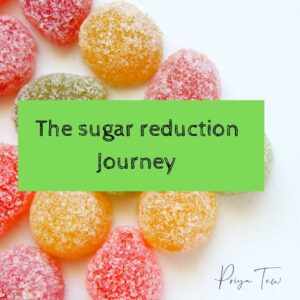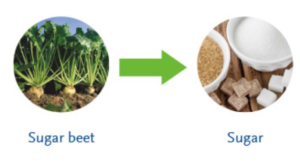
Disclaimer: This is a sponsored post written for Beneo.
Sugar is the generic name for sweet-tasting, soluble carbohydrates. They come in a variety of forms and they are in everything from your morning toast to your vegetable smoothie, and there’s no way of getting away from having some sugar in your day. Most people enjoy a little of that familiar sweet taste, the one you’re probably most familiar with is sucrose. This is the one you use to make cakes or add to your tea which is derived from sugar cane or sugar beet. Sugar also comes in other forms, like fructose (found in fruit) and lactose (found in milk and yoghurt). The sugars naturally found in fruit, vegetables, wholegrain and dairy are not the ones that we need to avoid or reduce. It is the added sugars and those found in honey and syrups we should consume less of overall or replace with an alternative option.
The big question is whether the sugars found in one product are better than those in others, and are the healthier sounding alternatives… actually healthier? A simplistic view is that all sugar is sugar and to some extent that is correct. However sugars are made up of different molecules and are used by the body in different ways. It’s a complex area and not one that I think we need to get hung up on. Essentially there are some differences in the way that the body digests different types of sugar – complex sugars (found in starchy foods and carbohydrates) are absorbed more slowly and provide lasting energy, whereas simple sugars (like sucrose) spike our blood sugar levels more quickly and are more damaging to our teeth. Most people would benefit from consuming less sweet foods and added sugars. But there are also circumstances where increasing sugar intake can be useful – for example, for those who are trying to gain weight or for endurance athletes.

So does this mean we should all just go sugar-free? I don’t think so. Sugar is something we cannot completely cut out of our diets. It is present in so many foods naturally and we all need a little sweetness in our lives. We shouldn’t feel guilty for enjoying sweet foods, in fact, humans have evolved to enjoy sweet foods! However, over time our food environment has changed and sweeter foods have become more readily accessible. The change in our lifestyle means more food is now being bought in snack form or as ready-made foods which are often higher in sugar. Portions have become larger and our sugar intake has increased. Some important work is being done to help us with this by Government policymakers. The Scientific Advisory Committee on Nutrition recommends the average person needs to half their sugar intake. That’s a big task. Over time there is a commitment from food manufacturers to reduce the levels of sugar in foods which is a good step, but what this does mean is we will all need to get used to eating less sweet food. We can also start to take our own small steps by making smarter choices. The evidence shows that if food manufacturers lower the sugar in foods we eat, this could have a very positive impact.
Instead of avoiding foods and being afraid of them, education and smarter choices are the key. For example Isomaltulose is a new type of sugar that has been formulated that is less sweet, producing a slower and lower rise in blood sugar. You can find out more about that here. This type of food innovation could help us transition to less sweet version of foods. Isomaltulose, a naturally occurring sugar that can also be commercially made and used in snack foods in place of traditionally used sugars like sucrose. Studies show that it has less of an impact on the body’s blood sugars and it is 50% less sweet than table sugar. Products like this, along with clever reformulation, can help take us all along the sugar reduction journey.
If you are interested in reducing your sugar intake, take a look at the sugar content of products you regularly buy and think about how you can work on replacing these. Are there any simple swaps from one brand to another that will help you on your sugar reduction journey?
References :
PHE: (2015)Sugar Reduction: The Evidence for Action
Thank you for this useful info. As a diabetic how much sugar is in anything is a question I ask daily. As an experimental cook I halve the sugar of anything I make. My taste buds have changed over time and I have got used to 85% dark chocolate which I found so bitter at the start of this journey.
Looking forward to more of these articles. ♡